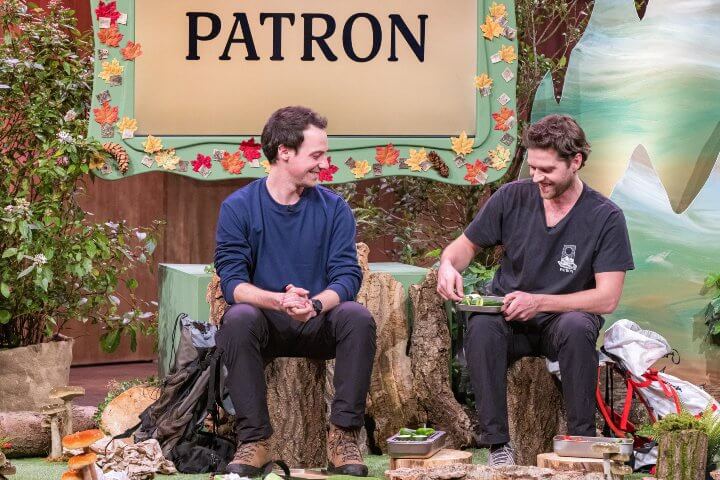Patron: When bumpy storytelling distracts from great numbers #DHDL
The importance of good storytelling is emphasised time and again in startup pitches, even if this is often overestimated when it comes to investors. On Monday's episode of ‘Die Höhle der Löwen’, startup Patron unfortunately learnt that it can backfire if a strong story is simply not understood.
Friday,
30.05.2025

Founders Raphael and Martin were extremely confident that they would be able to present their lunchbox to the lions and started their pitch with an important topic: the increasing amount of waste in nature, which every mindful outdoor sports enthusiast is sure to have noticed at some point.
They were also bothered by this and were inspired to launch a movement that has set itself the goal of cleaning up – and is now doing so across Germany and beyond during their so-called ‘clean-up days’.
These are meetings of volunteers who, armed with tongs and bin bags, go out into the countryside and remove rubbish from popular places. Volunteers can use an app to see where the next event is taking place and everything is organised online.
Over 50,000 people have now taken part, the movement has over 30,000 active users and estimates that it has already collected over 20 tonnes of waste.
However, this is not the ‘solution’ to the initial problem of waste in nature that the two founders are ultimately pitching. Their actual – and truly commercial – product is a different one.
The pitch actually revolves around the lunchbox they developed, which not only contains a wooden chopping board and a knife, but can also be attached to the leg with a strap to create a mini table.
There is also a barbecue grid with a gas connection which, together with a commercially available cartridge, turns the lunchbox into a barbecue in seconds.
The product is perceived as imaginative and of high quality, but very quickly Lion Nils Glagau seems to turn the conversation to something that has probably caught the attention of all the lions: how does this product prevent littering in nature?
The two founders argue from several sides, mentioning the basis of the clean-up community, in which they have successfully sold the box around 10,000 times without a marketing budget and thus generated over one million sales. They also argue that this community marketing and strong connection with the clean-up movement makes their customers even more aware of the problem of waste avoidance, and that a lunchbox – especially in combination with a knife and chopping board – helps to prevent people from going out with unsustainably packaged food in the first place.
But the TV investors seem to have realised that there is no direct link here and are dropping out one by one.
But how could this happen despite good figures and the otherwise popular social aspect of the business model?
A major problem with Patron’s pitch could be that, although it appears to follow the usual narrative structure of ‘problem – solution’, it doesn’t actually do so. This is because investors are used to being told the problem of a target group before the solution is presented.
This has established itself in the start-up world for a reason: not only is a pitch easier to understand, but it can also make the audience curious about the actual product and secure their attention. And if the two fit together really well and the pitch convincingly presents the so-called ‘problem-solution fit’, you hardly have to explain the raison d’être and often also the USPs – i.e. the unique selling points – separately.
But on the other hand, professional investors are also trained to think through this problem-solution fit in detail – and unfortunately, in the case of Patron, it became apparent that something didn’t really fit here.
Even though the clean-up events are part of the lunchbox’s origin story, the strong community is more a part of the Patron brand or supports it and enabled the great early sales figures despite the rather high price of up to €109 per box.
If we had wanted a clear problem-solution structure, it would probably have made more sense to describe the problem of the conscious and sustainably orientated outdoor sports enthusiast who cannot find a high-quality lunchbox that meets all their requirements.
But no matter how tried and tested the familiar structure is, not every start-up pitch has to follow it. If it’s done well, breaking with familiar patterns can even attract more attention.
An alternative for the pitch structure might have been to make it clearer that you first tell the story of the company’s origins and then emphasise the very good sales figures. This would have given investors the chance to concentrate on what they are pushing for the most: Making money.
Because good storytelling may distract for a while, but it can never really eradicate the numbers part. However, unclear storytelling simply causes confusion in the worst case and, as in this case, sometimes unfortunately means that even good figures don’t really come into their own.
Photo (above): TVNOW / Bernd-Michael Maurer

Ruth Cremer
Ruth Cremer is a mathematician and consultant as well as a university lecturer in the field of business models, key figures and financial planning. As a former investment manager, she knows what investors look for and also helps with pitch and document preparation in the investment or acquisition process. Since 2017, she is involved as an external consultant in the selection and preparation of the candidates in "Die Höhle der Löwen".
